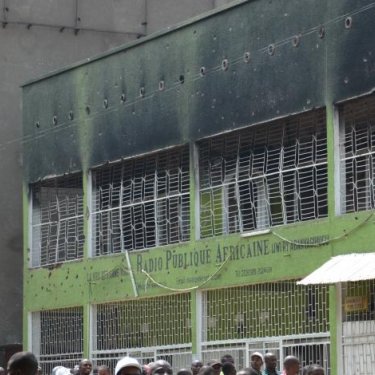Second anniversary of closure of independent radio stations

No independent radio stations have been broadcasting in Burundi since the authorities closed them down two years ago this week. The government still harasses and persecutes journalists and media outlets although it is now trying to create a semblance of pluralism in order to defuse international criticism. No one is fooled inside Burundi and, in the World Press Freedom Index compiled by Reporters Without Borders (RSF), Burundi is now ranked as a country where the situation is “very bad.”
Access to information is extremely limited. According to a report published by the newspaper Iwacu, the volume of news and information available on radio stations in Burundi is 73% less than before the authorities closed Radio Publique Africaine (RPA), Radio Bonesha, Radio-Télé Renaissance and Radio Isanganiro in May 2015.
Radio Isanganiro resumed broadcasting in February 2016 but only after giving a signed undertaking to the government. The other radio stations remain closed on the official grounds that they are still subject to an investigation that has yet to be concluded and may never have begun. Online social networks have filled some of the gap in the circulation of news and opinion but they are not immune to rumour and tend to be rather one-sided.
Scores of journalists are still living in exile while those still operating in Burundi are often threatened because of their profession and are often accused of working for “news media outside the country.” They are subject to constant restrictions and, when travelling anywhere to cover something, they must first notify the local authorities of their presence.
The Burundian Union of Journalists (UBJ) was closed in October 2016, at the same time as the main human rights groups. The few media outlets still operating tow the government line or have to be extremely careful in order to avoid incurring the authorities’ wrath.
There has been growing talk since 2015 of journalists being the “collaborators” of foreign government or “enemies of the nation.” The regime tolerates and even encourages such rhetoric, which fosters a climate of fear and self-censorship among journalists. It also legitimizes threats and acts of violence against them.
So, for the past two years, the media diversity that once characterized Burundi has been no more than a fading memory.
Behind the facade of pluralism
When Radio Isanganiro was allowed to reopen in February 2016, it had to give a written undertaking to adhere to certain editorial policies and, in the view of both journalists and listeners, it has operated under constraint ever since.
The authorities often intervene to get the station to “correct” its reports or to discourage its reporters from covering certain stories. Radio Isanganiro’s reopening is nonetheless held up as evidence of the government’s good intentions towards the media.
New media outlets that tow the government line, such as Ikihiro, have been created by government allies. The former spokesman of the National Intelligence Service (SNR), Télésphore Bigirimana, now heads the Burundian New Agency (APB). And the government does not hide its desire to one day reopen other media outlets that are still closed.
But if that happens, it will almost certainly be without their former staff. Arrest warrants are still pending for the directors of the leading radio stations and the mere fact of having been out of the country for a long like suffices to render journalists guilty. The journalist Jean Bigirimana went missing in July 2016, two weeks after returning to Burundi from attending a training session abroad. He has never reappeared.
This desire to restore apparent media “normality” was clear in communication and media minister Nestor Bankumukunzi’s comments on 3 May (World Press Freedom Day). While recognizing that the media continue to face difficulties, he urged media bosses to “hold on” until (international) partners resume providing them with funding.
This was an extraordinary request, given that Burundi refuses to give the European Union the human rights guarantees that would be necessary for state subsidies to resume.
Gabriel Bihimugani, the deputy head of the National Communication Council (CNC), went so far as to claim that Burundi has made major advances in media freedom in the past year.
He must have forgotten the arrests of two French journalists in January 2016, Bigirimana’s disappearance in July 2016, the arrest of a US journalist in October 2016, the arrests of Burundian journalists by the SNR and the police, and the online campaign of harassments and threats against VOA correspondent and SOS Média Burundi coordinator Willy Eloge Kaneza.
“There is now a danger that a facade of pluralism will create the illusion of a return to normality although an entire generation of trained and professional journalists is still in exile and cannot return, said Cléa Kahn-Sriber, the head of RSF’s Africa desk.We call on the Burundian government to stop harassing journalists and to conduct impartial investigations into the cases of journalists who have been attacked or who have disappeared. In particular, light must be shone of Jean Bigirimana’s disappearance. An investigation was launched in order to mollify his fellow journalists and family but seems to have been abandoned. To this end, we urge the authorities to cooperate fully with the UN Commission of Enquiry on Human Rights in Burundi.”
Burundi is now ranked 160th out of 180 countries in RSF’s World Press Freedom Index, after falling another four places in the past year.



